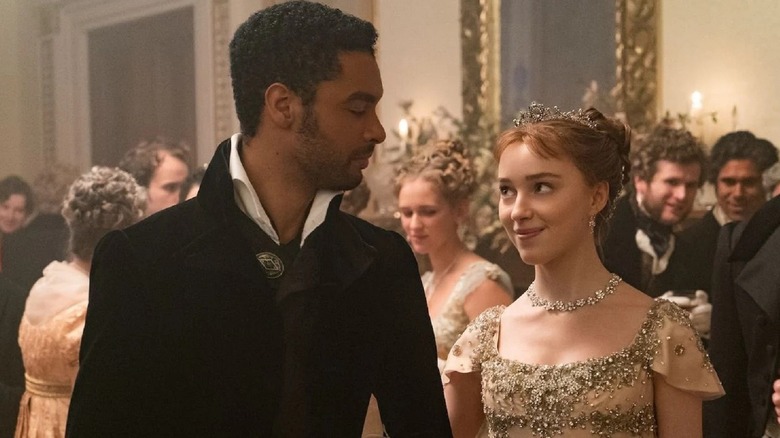What Is A 'Rake' In Bridgerton - And Why Is Simon Bassett A Perfect Example?
Fans of "Bridgerton" may have noticed that the Netflix historical drama features plenty of Regency period slang, and uses certain words in a context that a modern person might find unfamiliar and even outright strange. One such word is, of course, rake, which, in the show's universe, appears to describe a very particular type of person — most prominently, Regé-Jean Page's Simon Basset from "Bridgerton."
As the show's central heartthrob during Season 1, the Duke of Hastings is an instrumental part of the untold truth of "Bridgerton." But while Page does a great job at making his character a cool male lead fit for the show's setting, can Simon truly be called a rake? Let's dive a bit deeper into the origins of the term, and whether it really fits the Duke.
What is the meaning behind the word 'rake' on Bridgerton?
As the term is used on "Bridgerton," "rake" is an abbreviation of the old 16th century term "rakehell," which describes a rascally type of person who's quick on their feet. By the time of the show's early 19th century setting, the shortened term is essentially used to describe a "charming rogue" character archetype.
This is the type of smirking, adventurous person who likes to drift through life without committing, and who can be seen as highly untrustworthy before ultimately turning out to be a decent person. In other words, a rake is the kind of character pretty much every romantic story ever told uses to create friction and keep things interesting.
Why Daphne called the Duke of Hastings a rake
The ending of "Bridgerton" Season 1 establishes Simon Basset and Daphne Bridgerton (Phoebe Dynevor) as a true power couple, but their initial relationship is far different. In fact, since Simon is a charming, slightly scandalous guy who's completely open about his unwillingness to marry, the town knows him as a rake. Because she's aware of his reputation, Daphne refers to Simon as such when they meet.
Daphne dislikes Simon for being a rake, and Simon steers away from her since she's his friend Anthony's (Jonathan Bailey) sister. Armed with the assumption that this means there's zero chemistry between them, the two enter a pact of fake courtship for social purposes. This business-like agreement goes roughly as well as expected after the pressures of society force them into marriage and real feelings start to develop ... but Daphne's knowledge that Simon is an unmarrying rake is a large part of why it happens in the first place.
Is Simon Basset really a rake in the classical sense?
If we take the term "rake" to mean a scoundrel who's unwilling to settle down but ultimately noble, the Duke of Hastings fits the description to a tee. He's definitely charming and adventurous, and his decision to never have children means he's not looking to settle down.
However, like a true rake with a secretly honorable disposition, Simon Basset has a reason behind his aloof demeanor. He had an extremely difficult relationship with his stern and distant father (Richard Pepple), which prompted him to decide that he'll never continue the bloodline. This is a part of his backstory he's not particularly keen to share, which makes him a particularly romantic variation of a rake — one with a haunted past.



